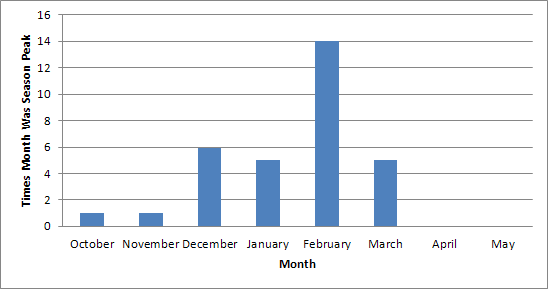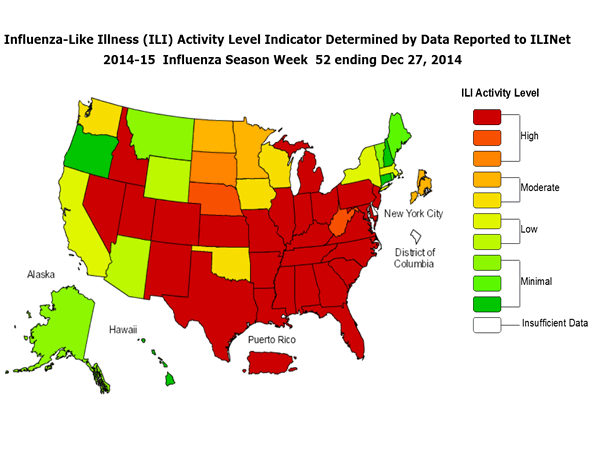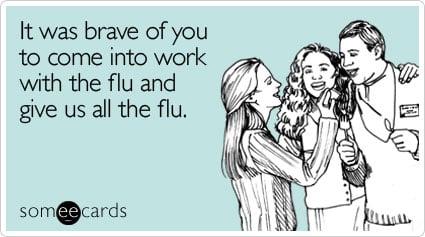Here’s what to do to survive the flu season in your office
So, I don’t know how it’s going lately in your office, but walking around Office Essentials has been like navigating through an obstacle course of sick people. People are hacking things up from their germy lungs, coughing, and sneezing everywhere. Then there are the ones that look like they are half-dead, you know, with the droopy eyes and the blank stares.
Even though the company has repeatedly reminded people not to come to work if they are sick, for some reason they continue to do so. I think it goes back to an old mind-set that working through sickness shows how tough you are. In the modern workplace, though, I think people are less impressed by the display of toughness and more concerned with avoiding contamination, especially given how easy it is to work from home these days.
If this doesn’t describe your office, it will soon. Flu season is kicking into high gear. The CDC says flu season is getting worse by the day, and it hasn’t even peaked yet. In most years, it doesn’t even peak until February.

So we’re not imagining all this, the flu season is definitely getting worse. Consider this relatively harmless map from November:
Cases of the Flu Across America in November 2014 — We were doing pretty good.

Now the country is on fire with the flu:

Ouch. But the good news is that there are things you can do to protect yourself, even if your co-workers continue to show up to the office with the flu. In fact, there are really only two big things you have to do:

1.) Get Vaccinated
The first thing to do is to get the flu shot if you haven’t already. The CDC says it is not too late. The flu season looks like it will peak this month, or then again it may not; but even if it does, the flu will still be around for months. This year’s vaccine has fared very well in roughly a third of the flu cases seen so far, and it will also protect you against other, late season flu varieties that sometimes surge in the late winter or spring.
And while the vaccine is not a guarantee that you won’t get the flu, it will often make your illness milder if you do.
And while we’re talking about it, let’s just dispel this myth right now: the flu shot doesn’t give you the flu. You can see this for yourself on the CDC’s website if you don’t want to take my word for it, but the shot really is the best way to make sure you won’t get the flu and keep from spreading it to others. On top of that, the more people that get vaccinated, the harder it is for the flu virus to spread.
By the way, it will take about 2 weeks for the vaccine to take full effect, so you should probably get the shot soon.
2.) Wash Your Hands Like It’s Your Job
Use soap and warm water and scrub them together for a minimum of 20 seconds. Don’t forget to get between your fingers and around your wrists. Then, and this is important…don’t undo everything you just did by turning off the faucet with your clean hands. Use a paper towel to dry your hands as well as to turn the water off and open the restroom door on your way out. (For more about all this, see our post How To Wash Your Hands Properly)

By the way, I said “use a paper towel” for a reason. The University of Westminster did a study that found high-speed air dryers actually increase bacteria count on hands by up to 42 percent, and warm-air dryers increase bacteria by up to 254 percent. Paper towels actually reduce bacteria on hands by up to 77 percent after washing.
2-A.) If you can’t wash your hands, use an alcohol-based hand sanitizer.
While the United States Food and Drug Administration doesn’t let anyone claim their hand sanitizer stops the flu, Purell, made by our partners at GoJo Industries, has been shown to eliminate 99.9% of the germs it comes in contact with.
I got all of this information from Rich Radil, our Product Manager for Facilities, Breakroom And Coffee Supplies (as well as our in-house germophobe), when I asked him for his advice on the best thing an office worker can do to avoid catching anything:
“Obviously, the best way to keep from spreading the illness is to stay at home when sick. Short of that, the single most important thing you can do to prevent illness at work is to wash your hands often with an antibacterial foaming hand soap. Also, utilize hand sanitizers from Purell. Purell kills 99.9% of germs known to cause illness.”
I also asked Rich what he thought was the best way for a company to stop a virus from breaking out and running rampant through the office. Here’s what he said:
I just saw a new Gallup Poll that estimates illnesses cost businesses $153 billion a year in lost productivity. To avoid being in that number, companies should invest in common preventative items for the workplace in an effort to combat the illnesses prior to an outbreak. Purell Hand Sanitizers, Kleenex, and Lysol Disinfecting Wipes should all be provided for each employee to have at their work station. Antibacterial soap, sanitizing stations, and increased sanitizing of items such as keyboards, tablets, phones, door handles, and desktops will also help to keep your employees healthy and productivity high."
Ok, but I have OCD and I need to do more things to stay healthy, do you have more tips for me?
Sure thing. Try these:
Turn away. Turn your head away from others and cough into your sleeve, elbow or tissue. Be sure to dispose of your tissue and wash your hands immediately to avoid spreading germs.
Keep moving. Exercise is an excellent way to stay healthy. A brisk walk of 20 minutes four or five times a week will help strengthen your immune system to fight off whatever comes your way.
Use antibacterial wipes. At work use antibacterial wipes on your phone and desk. Regularly wipe everything you frequently touch including your keyboard, mouse, pens, and desktop. In the breakroom and around the office, keep kitchen appliances and countertops, as well as bathroom surfaces and all door handles and light switches, wiped clean. At the store, take advantage of the antibacterial wipes often provided near the carts, a great place to pick up someone else’s bug. Research shows that germs travel around the office even quicker than previously thought, going from hands onto communal surfaces within hours and from there to your desk in the span of just a couple of hours.
In fact, you can spread your germs to other people more quickly by hand than you could by sneezing directly on them. (For more on this topic, see our post: Germs Spread Faster Than Gossip in The Office)
Hands off. Did you know that people touch their faces an average of fifteen times an hour? Keep your hands away from your mouth, nose and eyes, three prime germ entry spots.
Get your sleep. Sleep helps your body rejuvenate itself. When you’re run-down, your resistance drops, making you more susceptible to getting sick.
If you are feeling sick, determine if it is really the flu, or something else Because they are both respiratory illnesses and have similar symptoms, it can sometimes be difficult to know whether you have a cold or the flu. Typically, the flu is more intense than the common cold, and symptoms like fever, body aches, fatigue and cough are more common and more severe. Colds are usually milder, and are accompanied by a runny or stuffy nose. Our partners at Georgia Pacific have put together a list of the symptoms of each to help you tell them apart.
Cold symptoms
- Mild fatigue and weakness
- Runny, stuffy nose
- Sneezing
- Sore throat
- Mild to moderate chest discomfort
- Complications include congestion or ear-ache
Flu symptoms
- Sudden onset of fever (100.4°F) and lasts 3–4 days
- Headaches (can be severe)
- Aches and pains (can be severe)
- Fatigue and weakness (can last 2–3 weeks after the illness
- Debilitating fatigue, early onset (can be severe)
- Nausea, vomiting, diarrhea and watering of the eyes in children under 5 years of age
- Sore throat
- Chest discomfort (can be severe)
- Complications include respiratory failure; can be life threatening
When in doubt, call your doctor.
Let’s be careful out there
Here’s hoping that all the surfaces you touch around your office – most importantly your face – are (and remain) virus-free. If they aren’t, we can help.
More information
We’ve put all the items you need to survive into our Cold and Flu Survival Kit or contact us with any questions, we’re here to help.


I will be honest here, sometimes it is not so much the employee trying to appear “Strong” as it is the employer lacking options for the employee. Most institutions and office spaces (such as call centers) have very strict attendance rules which do not allow the employee any proper or health conscious decision making; because they don’t have out of office options. So when it comes to this – it needs to be addressed that some employees are simply not allowed the time out of office that they need, and enough time – to get over their virus before returning to work. They simply fear being fired for being sick.
You’re right, and that’s an important point. Thanks for taking the time to leave your thoughts.